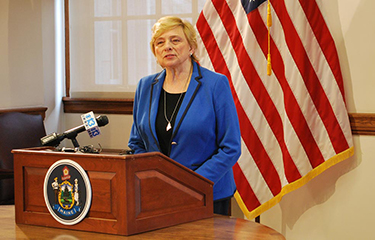Janet Mills, the governor of the U.S. state of Maine, has signed a bill limiting salmonid aquaculture introduced in the wake of American Aquafarms’ failed bid to establish a facility in Gouldsboro, Maine.
The bill, L.D. 1951, An Act Regarding Marine Finfish Aquaculture, places limits on the stocking density of salmonid aquaculture operations. The bill was sponsored by Maine Senator Nicole Grohoski and co-sponsored by Maine House Minority Leader Representative Billy Bob Faulkingham, and passed through committee in late May before quickly passing both the House and Senate before being signed into law by Mills.
The bill was spurred by opposition to the American Aquafarms project, which called for stocking densities as high as 40 kilograms per cubic meter for its farmed Atlantic salmon. The project floundered after it lost a bid for an essential lease, and since that time former American Aquafarms CEO Keith Decker resigned from his position and sold off the facility the company bought – with plans to make it a processing facility – in Gouldsboro, Maine.
The initial text of the bill caused some minor consternation from the Maine aquaculture industry, as it restricted all finfish aquaculture and set tighter limits than what is already allowed in the state. However, after a set of changes, the final version of the bill only limits the stocking density of salmonid species to 30 kilograms per cubic meter.
Cooke Aquaculture Vice President of Public Relations told SeafoodSource that the shift made all the difference.
“We appreciate that Maine legislators and the governor took a consultative and science-based approach to finalize the bill at a stocking density in the lease area of up to 30 kilograms per cubic meter,” Richardson said. “Previous bills (up to 22 kilograms per cubic meter) presented to the Maine Marine Resources Committee would have negatively impacted rural coastal jobs and restricted a producer’s ability to introduce new technologies and innovative equipment which otherwise enables aquaculture farms to operate even more sustainably.”
Environmental nonprofit Oceana also celebrated the bill as a sensible limit on net-pen aquaculture.
“Oceana applauds Maine for setting a clear, statewide stocking density limit for salmon and other finfish farms, which will prevent monster-size, disastrous aquaculture projects in our ocean,” Oceana Campaign Director Matt Dundas said in a release. “The message sent by this bill is clear: Maine will not be the testing ground for questionable aquaculture technologies that threaten the state’s ocean health, fisheries, and economy.”
Dundas said that the state still should do more to limit aquaculture.
“Setting density limits is a great initial step, but more action is needed to ensure that future farms do not undermine Maine’s coastal communities or harm Maine’s waters,” Dundas said. “In addition to limits on the total size of farms, Maine must also protect sensitive areas like Frenchman Bay.”
Photo courtesy of the office of Maine Governor Janet Mills







